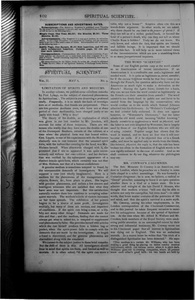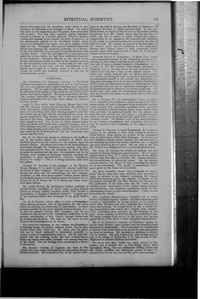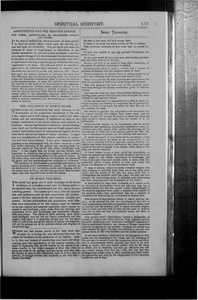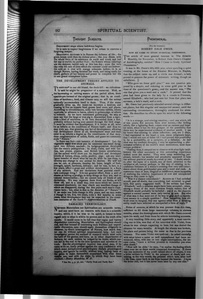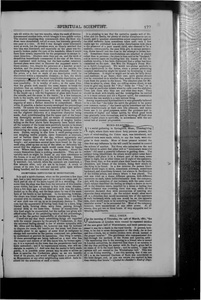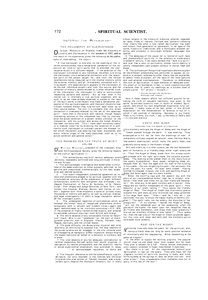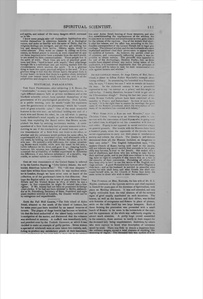The Word «Scientist»
Some of our English purists carp at the word scientist as an Americanism of recent introduction. If an Americanism it is a creditable one and a legitimate and needed word. It is quite as legitimate as jurist, annalist; for if the excuse for those words be that they come to us through the French, the question arises why have not the Americans as much right to make a derivation as the French? Having the Latin Seiens, Scienfis for a basis, why can we not form the word scientist as legitimately as the French can their annaliste from annalist? The word scientist is too firmly fixed in public use and favor to be ousted from the language by the conservatives who would confine us to the words which Samuel Johnson admitted into his dictionary. In “Webster’s Unabridged” we find scientist fully endorsed. It does not appear however, in “Worcester's Dictionary,” but the latter admits the old word scient, meaning “skilful knowing.” Surely scientists as euphonious a word as physicist, and the latter is not only admitted by Worcester, but is largely used by those of our English brethren who are still shy of using scientist. Popular usage has shown that the word is wanted, and we have no fear that it will ever become an exile. If it be objected that ist is a Greek suffix, and must be applied only to words from the Greek, like botanist, physicist, the reply is, that the rule has been broken too often in the formation of English words to be now rigidly enforced in the case of scientist. And so we shall continue to fly our flag, whatever the philologists may say.
Madame Helen P. Blavatsky
Madame Helen P. Blavatskv, of whom Gen. Lippitt makes honorable mention in his interesting account of the painting by John King, in our last week's number, is a Russian lady of rank, at present resident in Philadelphia. She is a niece of the late Countess Hahn-Hahn, well-known in literature; and is not only one of the most prominent Spiritualists of our day, but a lady of the highest culture. She writes and speaks English with the facility and accuracy of a native, and during her brief residence in this country she has commended herself to the esteem and admiration of a large and increasing circle of our most intelligent Spiritualist. Of her noble and disinterested efforts in advancing the cause of spiritual truth, not only by fearlessly witnessing to it, but by material aid and co-operation, we will not speak now. Our readers may soon look for contributions from her pen; and they may be sure that whatever she writes will be well worth, the reading.
<Untitled> (Within our own human hearts)
Within our own human hearts is the only devil that prompts us to wrong, the only adversary that ever becomes the hindrance to the perfection of our destiny. Look to it, then, and instead of shouldering your faults and short comings upon the imperfection of the creative scheme — instead of supposing that ye will benefit by the merits of another—realize in the bright example of Him who died to prove the truth of his sayings and not excuse your sins, that the destiny of man in this rudimental state is to be a man of sorrows, to struggle bravely and hopefully to the very last.—Emma Hardinge.
Damaged Terminology
Neither Materialism nor Spiritualism are scientific terms, and one need have no concern with them in a scientific inquiry, which, if it be true to its spirit, is bound to have regard only to what is within its powers and to the truth of its results. It would seem to be full time that vague and barren disputations concerning Materialism and Spiritualism should end, and that instead of continuing such fruitless and unprofitable discussion, men should apply themselves diligently to discover, by direct interrogation oi Nature, how much matter can do without spiritual (supernatural) help. Let each investigator pursue the method of research which most suits the bent of his genius, and here, as in other departments of Science, let each system be judged by its fruits, which cannot fail in the end to be the best sponsors and sureties of its truth. But the physiological inquirer into mind may, if he cares to do to, justly protest against the easy confidence with which some metaphysical psychologists disdain physiological inquiry, and ignore its results, without ever having been at the pains to make themselves acquainted with what these results are, and with the steps by which they have been reached.—Henry Maudsley, M. D.
Bell Omen
On the morning of Thursday, the 14th of March, 1861, “the inhabitants of London were roused by repeated strokes of the new great bell of Westminster, and most persons supposed it was for a death in the royal family. It proved, however, to be due to some derangement of the clock; for at four and five o'clock, ten or twelve strokes were struck instead of the proper number.” The gentleman who communicated this fact through the medium of the Notes and Queries, adds; “On mentioning this in the morning to a friend, who is versed in London antiquities, he observed that there is an opinion in the city that anything the matter with St. Paul’s great bell is an omen of ill to the royal family; and he added, ‘I hope the opinion will not extend to the Westminster bell.’ This was at 11 on Friday morning. I see this morning that it was not till 1 A. M. the lamented Duchess of Kent was considered in the least danger, and, as you are aware, she expired in less than twenty-four hours.”—Quoted in Chamber’s Book of Days.
Death and Sleep
Translated from the German of Krummacher
In a brotherly embrace the Angel of Sleep and the Angel of Death roamed through the earth. It was evening. They encamped on a hill not far from the dwellings of men. A melancholy stillness reigned all around; even the Ava Maria, that solemn evening bell, which melts the poet’s heart, was gradually dying away in the distant village.
Still and silent, as it is their custom, sat the two benevolent genii of humanity, in a friendly clasp, while night slowly set in. Then the Angel of Sleep arose from his mossy couch, and strewed with his light spirit-hand the invisible slumber- seeds. The evening winds wafted them to the lowly huts of the weary husbandman. Now sweet, refreshing sleep enveloped them all, from the aged with his staff to the nursling in his cradle; the sick forgetting his pain; the sorrowful, his grief; the poor, his cares. All eyes were closed. Having fulfilled his blessed mission, the kind and soothing Angel of Sleep laid down again near his stern brother.
“When the morning rays gild the eastern sky with the glory of our transcendental home,” said he, in blissful innocence, “then shall men bless me as their friend and benefactor! Oh, what joy, to do good invisibly and in secret! How happy are we faithful messengers of the good spirit! How beautiful is our silent calling!” Thus spoke the friendly Angel of Rest. The Angel of Death cast a sorrowful glance towards him, and tears, as only immortals can weep, glistened in his large dark eyes. “Alas!” said he, “why am I not permitted, like you, to enjoy the happy thanks of earthly children? The earth calls me her enemy, the disturber of her pleasures!” “O my brother,” replied the Angel of Sleep, “will not the redeemed soul, at her awakening, when the glories of the higher life dawn upon her, recognize thee as her friend and benefactor, and bless thee most gratefully? Are we not brothers, children of one father?’’ Thus spake he; then the sad orbs of the Angel of Death glistened again, but this time with hope and faith, and the brotherly spirits embraced more tenderly.
<Untitled> (Says the Pall Mall Gazette)
Says the Pall Mall Gazette, “The little island of Ayios Strati, situated to the south of the island of Lemnos, has for some years past been troubled by an annual invasion of locusts. The plague of these insects has become so intolerable that the local authorities of the island lately instituted an investigation of the matter, and discovered that the nuisance was attributed to sorcery. A council was immediately held, and presided over by the Turkish Governor, at which it was decided to make an example of guilty parties. Seven women suspected of witchcraft were at once taken into custody, and, filling to produce any satisfactory proofs of their innocence, were condemned to be cast into a deep pit in an ancient building. The witches, one of them being an old woman of ninety, and another a young girl of sixteen, were kept alive during a month with provisions which their relatives were allowed to lower to them by means of ropes. Two of the women were married, and their husbands were imprisoned and heavily fined for being united to witches. In the meantime, Emin Bey, the caimakam of Lemnos, who has jurisdiction over Ayios Strati, hearing of these measures, and also that, notwithstanding the imprisonment of the witches, the locusts were as numerous and troublesome as ever, gave orders for the release of the captives. One of the women died shortly after her release, and the affair has. according to the Dardanelles correspondent of the Levant Herald, led to legal proceedings. The released witches and the two husbands who were imprisoned and fined cited their persecutors to appear before the medjliss of Lemnos. As, however, the parties cited are all primates, and consequently influential people, it was impossible to obtain redress. The plaintiffs then appealed to the vali of the Archipelago, Ibrahim Pasha; but, as three months have elapsed without any notice being taken of the application, it is considered improvable that the primates of Ayios Strati will be taken to task for their unsuccessful crusade against locusts and witches.”
Editor's notes
- ↑ The Word «Scientist» by unknown author, Spiritual Scientist, v. 2, No. 9, May 6, 1875, p. 102
- ↑ Madame Helen P. Blavatsky by unknown author, Spiritual Scientist, v. 2, No. 9, May 6, 1875, p. 99
- ↑ Within our own human hearts by Hardinge, E., Spiritual Scientist, v. 1, No. 15, December 17, 1874, p. 173
- ↑ Damaged Terminology by Maudsley, H., Spiritual Scientist, v. 1, No. 8, October 29, 1874, p. 92
- ↑ Bell Omen by unknown author, Spiritual Scientist, v. 1, No. 15, December 17, 1874, p. 177. Signed: Quoted in Chambers's Book of Days
- ↑ Death and Sleep by unknown author, Spiritual Scientist, v. 1, No. 15, December 17, 1874, p. 172
- ↑ Says the Pall Mall Gazette by unknown author, Spiritual Scientist, v. 1, No. 10, November 12, 1874, p. 111

